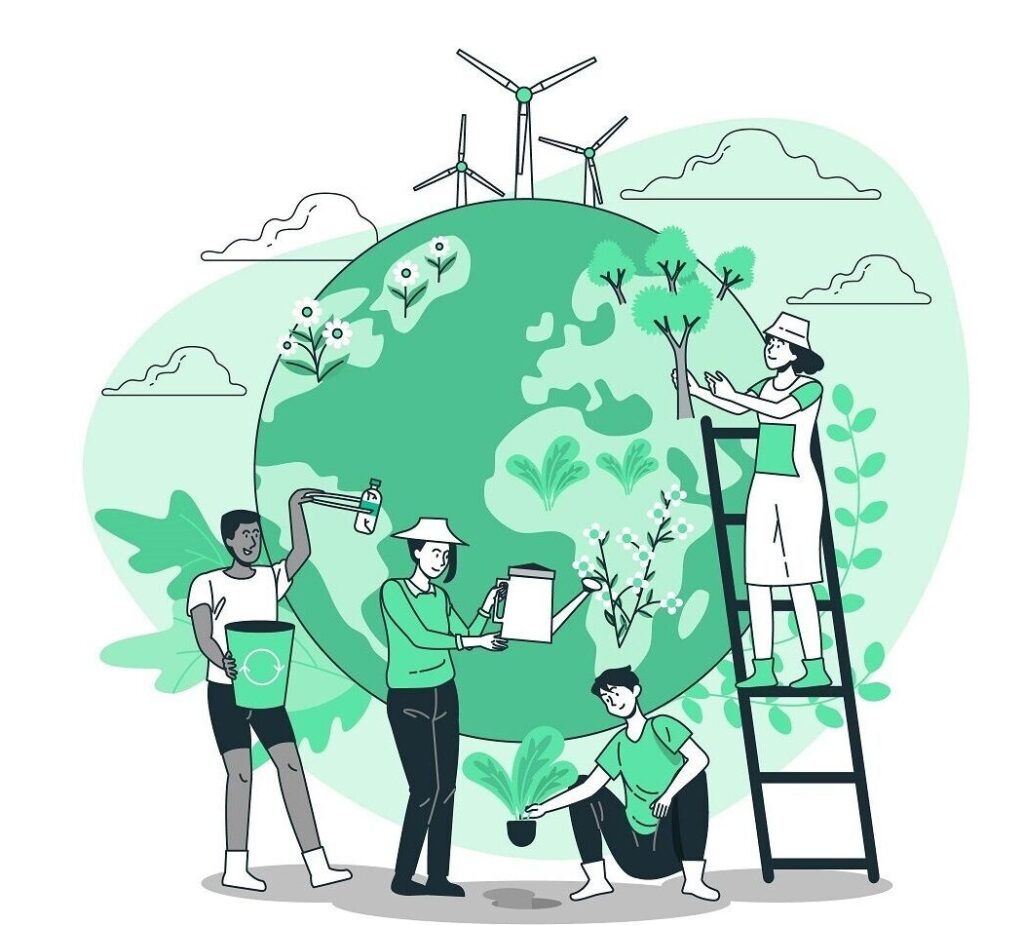2023 will be a historic year for the UAE. The country is going to host the 28th session of the Conference of Parties (COP 28) to the UNFCCC (United Nations Framework Convention on Climate Change) from November 30, 2023 to December 12, 2023.
According to Dr Sultan Ahmed Al Jaber, Minister of Industry and Advanced Technology and Special Envoy for Climate Change, COP28 will coincide with the UAE national day, which is December 2. And it will be a global event with participation from more than 80,000 delegates, including 140 heads of state and government, and more than 5,000 media professionals.
Dubai Expo City will serve as the venue for COP28. There can be no better location to host COP 28 than Dubai Expo City, as both COP 28 and Expo 2020 Dubai have some goals in common: achieving sustainability and encouraging global cooperation to address global issues.
If everything falls in place, the UAE will be the second country in the Middle East to host a COP session after Egypt. The UNFCCC made this decision after UAE received unanimous support from the Asia-Pacific group at COP 26 in Glasgow, Scotland in 2021.
Going by global reports, COP28 carries a lot of environmental expectations and is poised to take some major resolutions to combat climate change.
Meaning and Significance of COP
COP or the Conference of Parties is the apex decision making body of UNFCCC. UNFCCC was instituted to deal with the growing threat of climate change. It was signed in 1992 at the United Nations Conference on Environment and Development also known as Rio Summit or Earth Summit. The Secretariat of UNFCCC is located in Bonn, Germany.
The Presidency and venue of COP rotate among the five recognized UN regions – Caribbean, Latin America, Asia, Africa, Central, Eastern and Western Europe. The first COP meeting was held in Berlin, Germany in March 1995. COP is held every year unless the Parties decide otherwise.
Outcomes of COP 26
COP has had some significant outcomes since its first conference in Berlin. UN Climate Change Executive Secretary, Patricia Espinosa outlined the sustainable outcomes of COP 26 during the ministerial dialogue at OLADE energy week. Here they are:
- Adapting to the impacts of climate change. After COP 26, a work programme has come into existence to define how all the countries will adapt to this phenomenon.
- Creating more funds for developing countries to help them in the process of adaptation.
- Although emission levels have come down, more efforts need to be taken by governments. For this, the deployment of renewables needs to be accelerated.
- Finalizing the guidelines for the complete implementation of the Paris Agreement*. The compromise reached on Article 6 talks about carbon markets that will ensure fair competition. Along with this, negotiations on the ETF or Enhanced Transparency Framework were also finalized to help countries build trust.
* Paris Agreement – It is an international treaty on climate change that legally binds all parties involved in its goal of limiting global warming below 1.5 degrees Celsius. It was adopted during COP 21 in Paris in 2015.
Agenda for COP 28
Here are a few actionable steps that we can witness during COP 28 in November 2023:
- The transitional committee set up at COP 27 for the Loss and Damage Agreement* will be making recommendations on how to operationalize the fund at COP 28. Its first meeting will take place before the end of March. Unnikrishnan Divakaran Nair, head of Climate Change at the Commonwealth Secretariat said attention needs to be paid to the ways to collect and fill the fund and disburse it properly.*The Loss and Damage Agreement created at COP 27 aims to help low-income countries that are facing the effects of climate change.
- The $100 billion adaptation funding goal set in 2009 at COP 15 is yet to be fulfilled by the high-income countries. Although there was a daily loss of more than $200 million due to adverse climate, COP 27 negotiators failed to take a stand on adaptation finance. COP 28 will definitely witness the creation of a framework for the global goal of adaptation. This will help people whose work directly depends on a favorable climate like farmers.
- The CAF report (commissioned by a group of 20 major economies) postulates that the World Bank should take on a more prominent role in issues like climate change. Before COP 27, the World Bank President said that it was working with its shareholders to come up with a variety of approaches to tackle climate change. Development experts are of the opinion that the United Nations should push the World Bank to take on a larger role in monitoring the commitment of different countries to cutting global greenhouse gases. According to Rabah Arzeki, former Chief Economist and Vice President at the African Development Bank and Philippe Le Houérou, Chairman of the Board of the Agence Française de Développement, it is easy for an institution like the World Bank to take on a more active role in climate change as the majority shareholders will contribute more towards climate stability.
- Till now the JETPs (Just Energy Transition Partnership) has helped countries like South Africa (COP 26), Indonesia and Vietnam (last year) use blended finance to stop dependence on coal and transition to a more green energy mix.
- General António Guterres, the U.N. Secretary General, launched a plan at COP 27 that allows all the residents of the Earth to be covered by a multi-hazard early warning system over the next 5 years. In 2023, three things will be prioritized – identifying any gaps and analyzing the capabilities of people to handle the early warning system, moving ahead with the implementation, ensure that the funding is scaled up. Guterres will report on the developments at COP 28.
- The Global Stocktake (a 2-year process which happens every 5 years) began at COP 26 and will conclude at COP 28. At present, it is in its second phase – a time for technical assessment where the three themes (mitigation, adaptation, implementation and support) are being discussed through in-person dialogues. The findings will be presented and analyzed at COP 28.
- The Global Goal on Adaptation established under the Paris Agreement got a framework at COP 27. This framework will be discussed before COP 28 and should get adopted at the convention in November.
- A new food and agricultural security plan was created at COP 27. The only glitch was that the final agreement disregarded the food systems approach and overlooked important things like nutrition and dietary shifts, adaptation and mitigation work plans. The food and land use coalition program agenda includes pushing for a better outcome at the Global Stocktake and COP 28. In accordance with the goal of limiting temperature rising above 1.5 degree celsius, the Food and Agriculture Organization is ready to release a plan to reduce emissions from the food and agriculture system. The AIM(Agriculture Innovation Mission) for climate initiative will hold a summit in Washington. The initiative is led by the U.S. and the U.A.E. with U.N. as the founding member. It is aiming to increase the $8 billion funding for innovation in climate-smart agriculture to $10 billion by COP 28.
- The importance of the ocean and oceanic life will be presented at COP 28. The host UAE in its Nat-Zero 2050 strategy has already made efforts to restore and enhance ecosystems like seagrasses, mangroves and salt marshes.
Environmental Relevance of the UAE as the Host of COP 28
The position of the UAE as the host for COP28 reflects the government’s efforts to transform the economy into one that is fueled by clean and renewable energy sources along with technological advancements and climate-smart solutions. The conference will primarily focus on the economic case for inclusive climate action.
According to the UAE, it’s a privilege to get a chance to host COP28 and it certainly comes as a recognition of the country’s environment-friendly steps taken for over three decades. The UAE has been committed to battling climate change since 1989, the same year it ratified the Vienna Convention for the protection of the Ozone layer. After this, it became a member of the UNFCCC in 1995 and also ratified the Kyoto Protocol in 2005.
Some of the ‘green’ initiatives practiced and propagated by the UAE include:
- Agriculture Innovation Mission for Climate or AIM – A proposal put forth by the UAE and the US at COP 26. The objective of this proposal was to create huge investments in climate-smart agriculture and food systems over the next 5 years. The agriculture sector employs around 5 billion people globally. The UAE has pledged an extra $1 billion for this project.
- The UAE is one of the countries with the least methane emissions and as a part of this, it has joined the Global Methane Pledge. The hydrocarbon industries in the UAE have the world’s lowest methane intensities of 0.01%. The country also aims at reducing methane emissions by 30% by the end of 2023.
- The UAE government has also taken steps to maximize the sources of renewable energy. A $400 million investment has been made to help developing countries transition from old methods of energy generation to renewable sources.
- The Ministry of Energy and Infrastructure in UAE has created a blueprint-Hydrogen Leadership Roadmap, that contains comprehensive steps to establish the country as a leading exporter of hydrogen by supporting low carbon industries.
- The UAE is also home to the first of its kind large scale carbon capture facility (CCUS). This facility aids in reducing the cost of solar energy.
- By the end of the decade, the UAE aims at planting 100 million mangrove trees as part of its second NDC (Nationally determined contribution). NDC was adopted from the Paris Agreement.
- The government also spent $17 billion on helping 27 island nations facing the climate change threat. Many projects like solar, wind and battery storage were initiated here.
- In April 2022, the Barakah Nuclear Plant started its operations. Once the four reactors of the plant are fully operational, the greenhouse gas emissions of UAE’s power sector will reduce considerably.
- Net Zero 2050 is another strategic initiative that aims at making the UAE carbon-neutral by mid-century. The UAE was among the first countries in the Middle East and North Africa to announce this project.
Words from the UAE Government Representatives
Several representatives of the UAE government expressed their gratitude for the UNFCCC’s decision.
Remembering the legacy of the founding father of the UAE, Sheikh Abdullah bin Zayed Al Nahyan, Minister of Foreign Affairs and International Cooperation stated, that COP 28 should be a ‘solutions COP’ and it should create shareable solutions for all the difficult challenges the world is facing today.
Dr Sultan Ahmed Al Jaber, Minister of Industry and Advanced Technology and Special Envoy for Climate Change said that COP 28 should be a stage of inclusivity. Each representative, whether it is the public sector or private sector, developed nation or developing nation, academicians or civilians, should be able to express their opinions and concerns. He said that the UAE believes in the motto ‘partnership promotes progress’ and this motto should reflect in the upcoming COP 28.
Mariam bint Mohammed Almheiri, Minister of Climate Change and Environment, said COP 28 will be the perfect platform to understand the ‘planetary and economic aftermath of climate change’ and constitute solutions for the same. She said the UAE’s ‘challenges are opportunities’ approach has helped the country to create a sustainable future for the coming generations. She said COP 28 will help them share their insights about this approach as well. She also expressed her desire to expand youth participation in the COP proceedings.


